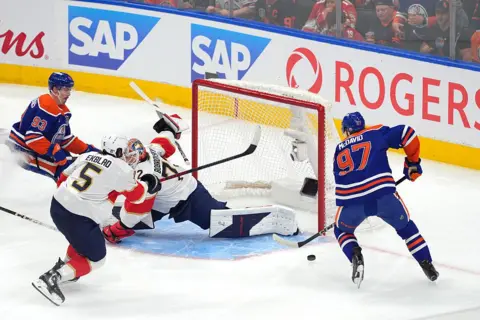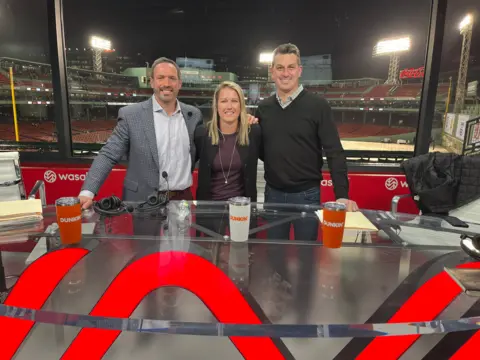BBC News
 Getty Images
Getty ImagesThe Edmonton Oilers are heading south to Miami to fight to bring the Stanley Cup back to Canada for the first time since 1993.
They will be hoping to avoid a repeat of last year when they made the same trip and lost.
For over 30 years, the winner of the National Hockey League’s top prize has gone to an American team. It’s a sorry legacy for a country where ice hockey is not just a sport, but part of the national identity. About 40% of players in the NHL, across all teams, are Canadian – more than any other country.
Last year, the Oilers flopped during the final game of the seven-game series against the Florida Panthers.
It was a “heartbreaking” loss for Carson Duggan, who grew up in rural Alberta and now lives in the US. She had travelled all the way to Miami to watch that final game, where she says she was joined by thousands of other Canadians.
It’s a sore point for many Canadians that the league’s most die-hard fans have gone so long without a trophy, and yet remain willing to spend big money and travel big distances to support their team.
Now Edmonton has a second chance at breaking the losing streak this year, but heading into Game 6, there are concerns that history could indeed repeat itself. While the Oilers began the series strong, winning the first game 4-3, the Panthers demolished Edmonton 5-2 on Saturday, giving them a 3-2 series lead.
Tuesday’s game, in Miami, will be do-or-die.
The repeated losses have, in a way, united Canadians against a common enemy – the US. Although there are seven Canadian teams in the NHL for Canadian fans to cheer for, when it comes to the playoffs most get behind whichever Canadian team goes the farthest. Thus, in this year’s final series, the Edmonton Oilers have been christened, by elimination, Canada’s team.
“I think it’s just like, we need a cup as Canada,” Ms Duggan said. “A lot of Canada is cheering for Edmonton.”
This is especially true because of tensions between Canada and the US, which have heightened amidst a testy trade war.
The international rivalry really came to a head during the winter’s 4 Nations Face Off, when Trump was repeatedly making digs at Canada by calling it the “51st state”.
Canadians booed the American national anthem during the game, and three fights broke out on the ice during the first nine seconds of one game. Shortly after Canada won the 4Nations, Canadian comedian Mike Meyers appropriated the hockey term “elbows up” as a rallying cry for Canadian sovereignty.
The slogan was adopted by Prime Minister Mark Carney (whose hometeam is Edmonton) during his election campaign.
Meanwhile, US President Donald Trump has personally called the Panthers, who play about an hour away from his estate Mar-A-Lago, to offer his support.
Temperatures between the two countries have seemed to cool a bit, Ms Duggan said. But that doesn’t mean that a Canadian win wouldn’t be a “cherry on top”.
“We’re not going to be bullied,” she said, adding that she thinks “most Canadians know that most Americans are good people”.
 Submitted photo
Submitted photoEvery Canadian has their own hypothesis as to why Canadian teams have not won the Cup since 1993, from the mundane to the downright conspiratorial.
For starters, under the eye of NHL Commissioner Gary Bettman, American franchises have vastly overtaken the league, with seven out of eight new teams since 1993 going to sunshine states like Nevada, Florida and most recently, Utah. Now there are just seven Canadian teams compared to America’s 25.
Others point to the mild temperatures and lucrative tax breaks in many US states as a draw for free agents.
Ms Duggan likes to think it’s at least partly because of ice hockey’s uniquely egalitarian gameplay – players are only on the ice for 45 seconds at a time, typically, which means that even a star player, like the Oiler’s captain Connor McDavid, can’t monopolise the rink.
 Getty Images
Getty ImagesThe 28-year-old, whose been compared to Hall of Famer Wayne Gretzky, has been playing with the team since he was first draft pick in the NHL during the 2015-2016 season. While it’s taken the Oilers years to get to the level that they’re playing at now, even then it was clear he would be a star.
“If he was drafted to Boston or Chicago or Philly or Rangers, or really any team in the United States, I think hockey would have grown exponentially,” Ms Duggan said. “You could know absolutely nothing about hockey and watch five minutes and see [he’s] the best player.”
Now living in New Hampshire, after moving to the US to play university-level ice hockey and coach, Ms Duggan – whose great-grandfather was a mayor of Edmonton – said the Oilers are still her home team.
“I think that was a piece of home that was always there,” she said. “They’ve probably taken years off my life, because some of their puck drops are at like, 10pm, and I stay up and watch every single game.”










